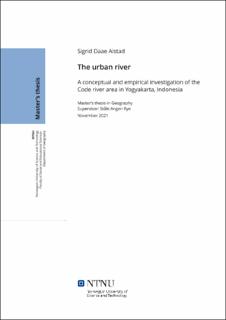| dc.contributor.advisor | Rye, Ståle Angen | |
| dc.contributor.author | Alstad, Sigrid Daae | |
| dc.date.accessioned | 2022-01-12T18:20:54Z | |
| dc.date.available | 2022-01-12T18:20:54Z | |
| dc.date.issued | 2021 | |
| dc.identifier | no.ntnu:inspera:95428802:23088569 | |
| dc.identifier.uri | https://hdl.handle.net/11250/2837185 | |
| dc.description.abstract | Studier av vann og by tillater en utforskning av de komplekse relasjonene mellom natur og samfunn. Basert på en gjennomgang av hvordan den skiftende forståelsen av ‘natur’ innen geografi har skapt et dualistisk skille i faget, har denne oppgaven som mål å utforske hvordan natur-samfunnsrelasjonene i byen kan forstås gjennom en studie av den urbane elva.
Dette målet er integrert i oppgaven gjennom to tilnærminger til studiet av den urbane elva. Gjennom den konseptuelle tilnærmingen blir urban politisk økologi (UPE) brukt for å vurdere hvordan dets teoriseringer om natur-samfunnsrelasjonene i byen og konseptene relatert til det urbane vannet kan bli brukt for å forstå den urbane elva. Her blir den hydrososiale syklusen presentert og brukt gjennom spørsmålet: Hva er elva? Elva som en hybrid og sosionaturell strøm, som en materiell strøm, og som en ressurs blir utforsket som konsepter som muliggjør en forståelse av elva som en aktiv del av produksjonen av det sosionaturelle urbane rommet. Gjennom bruk av litteratur innen UPE på urbant vann, integrert vannressursforvaltning (IWRM), og vannstyring, blir de teoretiske og empiriske mulighetene knyttet til situert UPE utforsket. De teoretiske og empiriske mulighetene ved bruk av konsepter rundt vannets urbane politiske økologi kommer deretter også til syne gjennom den empiriske tilnærmingen, en dokumentanalyse av empirisk forskning gjort på området knyttet til elva Code i Yogyakarta, Indonesia.
I dokumentanalysen blir åtte forskjellige perspektiver innen empirisk forskning på området knyttet til elva Code identifisert og diskutert ved bruk av konsepter knyttet til vannets urbane politiske økologi og situert UPE. Flommur, arealplanlegging og arkitektur, lokal deltakelse, turisme, fokuset på teknologi og ingeniørarbeid, og bruken av bærekraftsbegrepet og termet ‘slum’ er alle aspekter i området knyttet til Code hvor det urbane elveområdets hydrososiale relasjoner kommer til uttrykk på forskjellige måter. Dette skaper en forståelse av hvordan elva og bosettingene langs bredden er knyttet sammen gjennom den hybride og materielle elvestrømmen, og verdien av elva som en ressurs. Dette tilrettelegger for en forståelse av hvordan urbaniseringsprosessene i elveområdet blir konstituert gjennom komplekse natur-samfunnsrelasjoner, med den hydrososiale syklusen som utgangspunkt. Sammen utforsker de to tilnærmingene til studiet av den urbane elva hvordan natur-samfunnsrelasjoner i byen kan bli forstått gjennom bruken av vannets urbane politiske økologi. Tilnærmingene fremhever på denne måten hvordan et geografisk forhold eller enhet kan bli studert som et hybrid, og bidrar slik til å overkomme det ontologiske og epistemologiske skillet innen geografifaget. | |
| dc.description.abstract | Studies on water and the city allows for exploring the complex relations of nature and society. Building on an account of how the changing understanding of ‘nature’ within the discipline of geography has created a dualistic divide of the field, the aim of the thesis is to explore how the nature-society relations of the city can be understood through the study of the urban river.
This aim is integrated in the thesis through two approaches to the study of the urban river. Through the conceptual approach, urban political ecology (UPE) is engaged with to consider how its theorizations of nature-society relations and the concepts related to water can be used to understand the urban river. Here, the hydrosocial cycle is presented and engaged with through the question: What is the river? The river as a hybrid and socionatural flow, as a material flow, and as a resource is explored as concepts of which enables an understanding of the river as an active agent within the production of the socionatural urban space. Through the engagement with UPE literature on urban water, Integrated Water Resource Management (IWRM), and water governance, the theoretical and empirical possibilities of a situated UPE is explored. The theoretical and empirical possibilities of engaging with UPE of water on the urban river is further expressed through the empirical approach, a document analysis of empirical research on the Code river area in Yogyakarta, Indonesia.
In the document analysis, eight different perspectives on the Code river area within empirical research are categorized and discussed through an employment of the concepts of UPE of water and situated UPE. The riverside dike, spatial planning and architecture, local participation, tourism, the focus on technological and engineering, and the use of the sustainability concept and the term ‘slum’ in the research are all aspects of the Code river area through which the hydrosocial relations of the urban river area are expressed in different ways. This allows for understanding how the Code river and the kampung is connected through the hybrid and material flow of the river, and the value of the river as a resource. This enables an understanding of how the urbanization processes of the urban river area are constituted through complex nature-society relations, with the hydrosocial cycle as an entrypoint. Together, the two approaches to the study of the urban river explore how the nature-society relations of the city can be understood through the employment of UPE of water. The approaches highlight in this way how a geographical condition or entity can be studied as a hybrid, thus contributing to overcome the ontological and epistemological divide within the geographical discipline. | |
| dc.language | eng | |
| dc.publisher | NTNU | |
| dc.title | The urban river: A conceptual and empirical investigation of the Code river area in Yogyakarta, Indonesia | |
| dc.type | Master thesis | |
